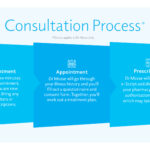Women’s Health Services
Menopause
Understanding menopause and developing a strategy to manage your symptoms can improve your health and lifestyle. If your symptoms are bothering you, your doctor can help.
Your doctor can tell you about the changes in your body and offer options for managing your symptoms. Many treatment options are available and include:
- Lifestyle changes: Improving diet, regular exercise and stopping smoking can improve your overall wellbeing and make symptoms easier to tolerate. Some psychological treatments e.g. cognitive behavioural therapy (CBT) and mindfulness may also help (See AMS information sheets – Lifestyle advice for healthy ageing and Menopause and body changes)
- Menopausal Hormone Therapy: (See AMS information sheets – Combined menopausal hormone therapy and Treating the menopause – the concept of risk and benefit)
- Non-hormonal treatment options: (See AMS Information Sheet Non-hormonal treatments for menopausal symptoms)
- Complementary therapies: (See AMS information sheet – Complementary and herbal therapies for hot flushes) If you have any concerns or questions about the options to better manage your menopausal symptoms, visit your doctor or go to ‘Find an AMS Doctor service’ on the AMS website.
Speak with Dr Amatul Ali today to better manage your menopause health.
About Dr Amatul Ali
Dr Amatul Ali is passionate about Women’s Health and is part of the Australasian Menopause Society.
Do you know which birth control is right for you?
There are many contraceptive methods available in Australia, including implants, intrauterine devices (IUDs), injections, pills, vaginal rings, barrier methods, sterilisation, emergency contraception and natural methods.
When you are choosing the method of contraception that is right for you, it is important to have accurate information and think about which option best suits you. Different methods may suit you at different times in your life.
Come discuss your contraception options with your friendly and caring GPs today.
Get a breast screening every two years
Women aged 50-74 and those who are at average risk for breast cancer are recommended to get breast screening every two years. As breast density is lower in women over 50, it is easier to realise small cancers on a screening mammogram.
If you are between the age of 40 to 49, you should talk to your doctor today about when to start and how often to get a mammogram screening. Together, you can decide what’s best for you based on your personal preferences, your medical history, your family history, and your individual breast cancer risk.
Cervical Screening
The Cervical Screening Test replaced the Pap test in December 2017. The Cervical Screening Test detects infection with human papillomavirus (HPV). HPV is a common virus that causes most cervical cancers.
Early detection and prevention save lives. Therefore, the National Cervical Screening Policy recommends that women:
-
have an HPV test with partial genotyping every 5 years
-
start cervical screening at age 25
-
have an exit test between 70 and 74 years of age
-
have an HPV test at any age if they have symptoms of cervical cancer, even if they screen regularly
Ref: Australian Government Department of Health and Aged Care

Men’s Health
Erectile dysfunction
It is estimated erection problems affect about 1 in every 5 men over the age of 40. Erectile dysfunction can have a range of causes, both physical and psychological. It is usually a combination of both. Sometimes there is no clear cause.
Many men experience erection problems from time to time. But if the problems continue, see your doctor. Diagnosing and treating causes like diabetes, high blood pressure or high cholesterol can prevent or delay erectile dysfunction, or stop problems from getting worse.
For more info, visit: www.healthdirect.gov.au/erectile-dysfunction
Premature ejaculation
Premature ejaculation is the most common sexual problem to affect men. It is more common in younger men, as ejaculation tends to take longer as men get older, but premature ejaculation can happen at any age.
Some men may have physical problems tied in with premature ejaculation, such as impotence or high blood pressure. Some medicines can make it worse too.
You should talk to your doctor if you are experiencing delayed ejaculation because they can provide reassurance, assess to identify the cause and offer management options. It can also help to talk to your partner and include your partner when you talk to a health professional.
For more info, visit: https://www.healthdirect.gov.au/premature-ejaculation
Prostate Cancer
Prostate cancer is the most commonly diagnosed cancer in men in Australia, affecting up to 1 in 7 men by the age of 75.
Family history, ethnicity and age can affect your chances of getting prostate cancer.
You should speak to your GP if you notice any unusual or ongoing changes in your toilet habits (e.g. when you urinate) and pain in the lower back, upper thighs or hips.
Most often, these won’t mean you have cancer, but finding cancer early improves the odds of treating it successfully.
You don’t have to wait for symptoms to speak to your GP. If you are concerned, speak to your doctor about your risk, and discuss the risks and benefits of prostate cancer screening.




